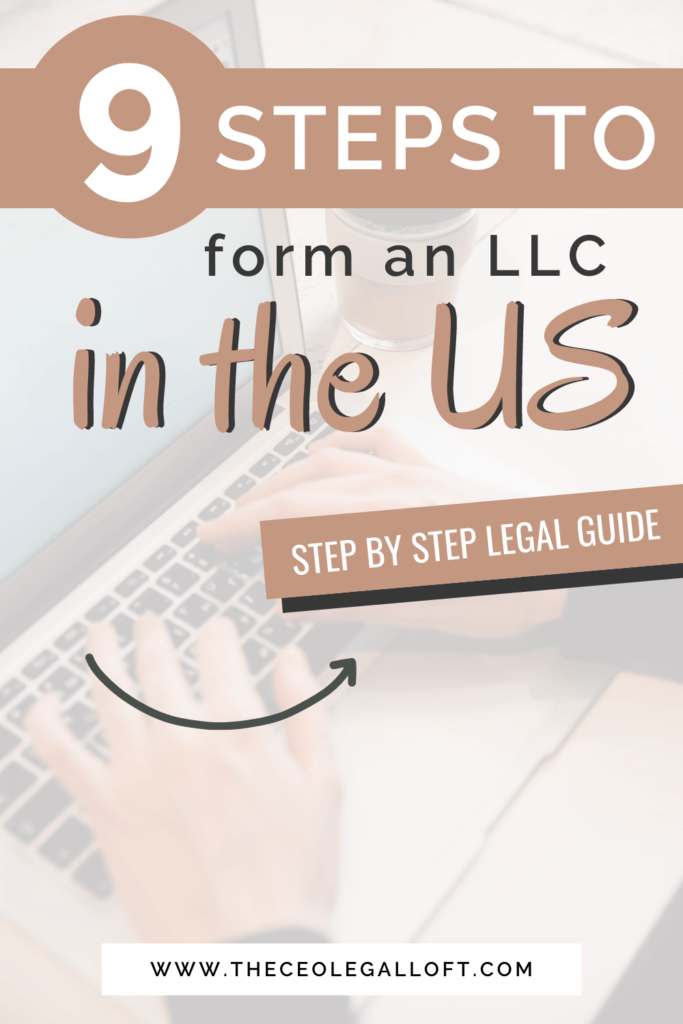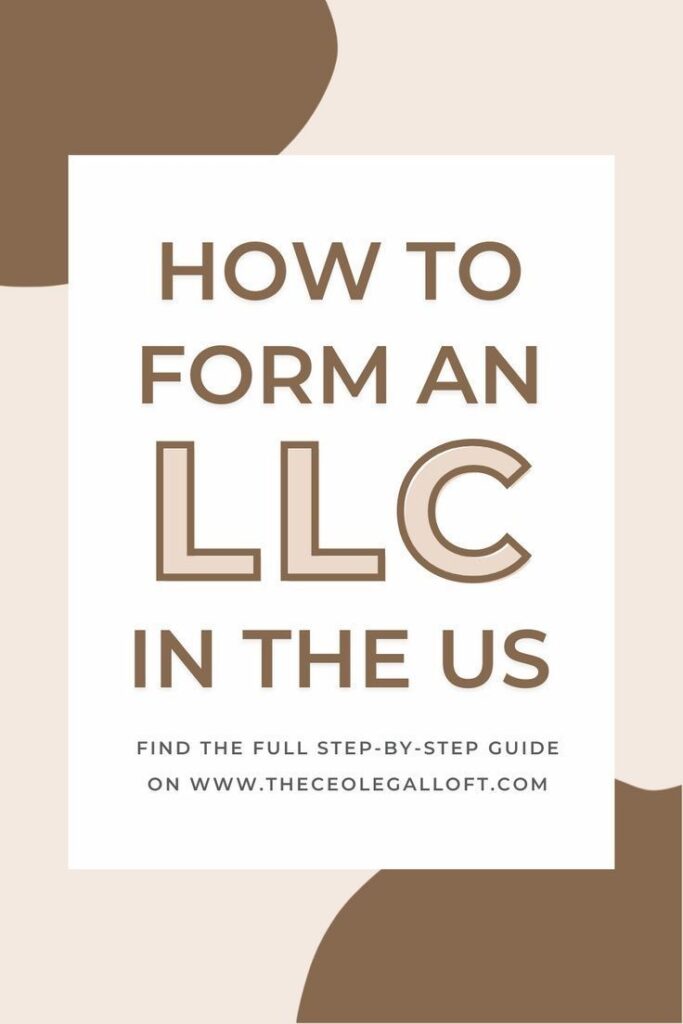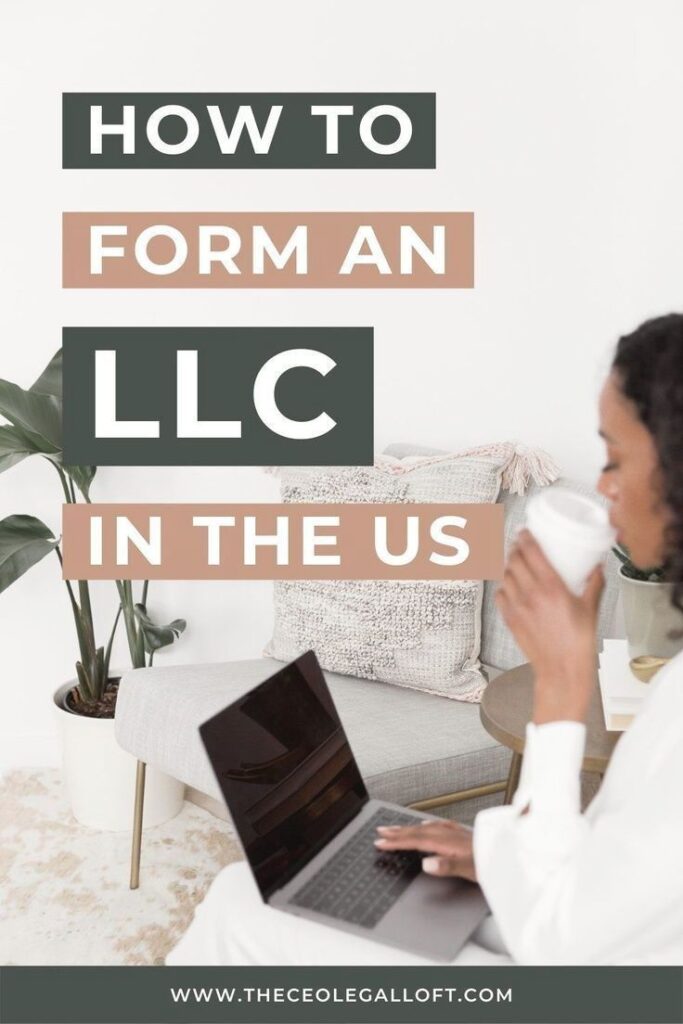Congrats! You’ve decided to start a business. But now what?
You open up your laptop and type “how to start a business” in Google and one of the first results says you need to open an LLC (limited liability company).
But how do you form an LLC and what happens after?
I’m the attorney who doesn’t think you need to form an LLC right away except under certain circumstances. However, it will need to be done eventually if you plan on having a long-lasting, successful business.
Before creating your LLC, you’ll need to consider certain factors when setting up your LLC like personal liability and taxes, among other things.
In this blog post, we’ll be discussing how to form an LLC plus the advantages and disadvantages of having one.

What does LLC mean?
An LLC is an acronym for limited liability company. It’s a type of business entity that combines some partnership features with a corporation. So, it can be safely called a hybrid business entity. An individual can form an LLC, and there is no cap on membership.
Each state has laws regulating LLCs, so you’ll have to check the statutes and Secretary of State website to be sure you’re following your state statutes. In LLCs, owners are members; however, note that not all businesses can open an LLC.
Businesses relating to banking, medical services, and insurance can’t run under an LLC due to the nature of those industries.
How do you form an LLC?
Like every other business, there are procedures you need to follow when forming an LLC.
Choose an Available Name
The name you choose for your LLC has to follow applicable rules in the state you’re opening your LLC. Although the rules are distinct, most states demand that your LLC name carries the word LLC at the end or at least the word, LIMITED COMPANY. The name must also not be an existing entity in the state you intend to form the LLC. You can make a reservation for your LLC name for a brief period pending the time you conclude your Articles of Organization filing.
A common misconception when choosing a name for your LLC is that it will protect your brand like a registered trademark and that’s not true. Your LLC is about liability and the name of it truly doesn’t matter. If you want to protect the names within your business, then you’ll need to file a trademark application with the United States Patent and Trademark Office.
Filing your Articles of Organization
You can complete the Articles of Organization online or on the website of your secretary of state. You’ll need the following information:
- Name of your LLC
- Name and address of its registered agent
- Names of owners
Payment of filing fees is often required when submitting the articles. The cost is usually in the hundreds, but some states have more expensive fees.
Choose a Registered Agent
Another requirement is to have a registered agent. A registered agent is someone put in place to collect official documents (including legal papers in case of litigation) for your LLC. Ensure the registered agent has a physical address in the state hosting the LLC. Any member of the LLC can also act as a registered agent.

Decide Management Style
While their members can directly manage some LLCs, LLCs are generally at liberty to appoint outsiders to run the business affairs (managers), just like how a board of directors works in a corporation. These managers have the mandate to vote on important issues, including but not limited to acquiring properties, taking a loan, or coming up with plans needed to pilot the company’s affairs successfully.
Creating an Operating Agreement
While many jurisdictions don’t require this, it is still essential to have an operating agreement while forming your LLC. The operating agreement is primarily an in-house document detailing the operation mode of your LLC. Should you choose not to have an operating agreement for your LLC, then the relevant law of the state will govern its operation.
Compliance with Tax and Regulatory Framework
Some taxes and regulations may apply to your LLC. One of them is the Employer Identification Number, often referred to as EIN.
If your LLC has more than a member, it is mandatory to obtain a unique EIN from the IRS whether or not you have employees. Further, if you form a single-member LLC, you have to obtain an EIN but only if the LLC intends to have employees or choose a mode of taxation other than a sole proprietorship. You can get your EIN by completing an application on the IRS portal.
You may also need business licenses. You may have to get other local and state business licenses; however, this depends on the type of business and location. Don’t forget to enquire at the designated agencies in your state to ensure proper registration and have a hitch-free operation.
There is also Sales and Employer Taxes. There are situations where you will need to register with the state taxing authority. These taxes are dependent on what type of goods or services you’re selling. Additionally, employer taxes can be set up through your payroll company. I highly recommend Gusto.
Physical Mailing Address
You’ll need a mailing address In the state you form an LLC.. One of the common ways to get a mailing address in the USA is to set up a physical office in the state you will form an LLC so far your business requires it. Even if you don’t need to set up a physical address in the US, a US mailing address is still necessary for the state you intend to form an LLC. You’ll be able to use a virtual address on your LLC paperwork if you aren’t comfortable using your home address. I use and recommend iPostal1.
Opening a Business Bank Account
A key element of having an LLC is keeping your personal assets separate from your business assets. One way you’ll do this is by keeping a separate business bank account.
You can open your business bank account at any major bank or credit union in your state. The banks may require the following:
- EIN
- Business license
- LLC Articles of Organization
- Operating agreement
- LLC Bank resolution
Further, you don’t need to open a bank account in the state you form an LLC, but the bank must have some presence in the particular state.
Filling of Annual Reports
Most states require LLCs file an annual report plus fees. These annual fees may be higher in some states than others.
After you form an LLC in Florida, you’ll need to file an annual report confirming current information regarding addresses, registered agents and persons authorized to manage your LLCs. You can also make any necessary changes. Take note that the report is due yearly by 1st May. Filing fees are about 140 bucks for LLCs, and the penalty for late filing is 400 bucks.
Check your Secretary of State website to find out the requirements of the annual filing.

Advantages and disadvantages of an LLC
Now that you know the basic steps to form an LLC, here are the advantages and disadvantages of having an LLC.
Advantages of creating an LLC
Limited Liability
This is one feature an LLC closely shares with a corporation. Forming an LLC gives business owners a strong guard against debt and liability.
How does this work?
Imagine a fashion enterprise named The Nude Collection owned by Rachael, and she’s losing customers to a competitor with more funds. The business is taking a nosedive, and the company is struggling even to pay rent. Let’s say The Nude Collection owes about $75k to its creditors, who have now instituted an action against the company in court.
While the creditors have limitless right to stake a claim to the money owed by the company, they have no right whatsoever to Rachael’s personal assets (unless she’s taking actions to “pierce the corporate veil”). This feature is a big reason to form an LLC, as this is not available in a sole proprietorship or partnership.
Taxation
LLC doesn’t get taxed directly by IRS since they are separate entities. The tax burden is on members paying through their personal income tax.
Take note that you can also file as an S- Corporation if you have an LLC. Electing S-Coporation status allows you to save in taxes.
Less Burdensome Establishment Process
Forming an LLC doesn’t require much paperwork and costs. LLCs are much simpler and have minimal compliance issues compared to a corporation. There is also noticeable freedom in the management set-up since there is no need for a board of directors, annual general meetings, or strict records.
Disadvantages of creating an LLC
Despite the advantages forming an LLC has over other business entities, consider the roadblocks below before deciding that an LLC is best for your business.
Lifecycle
The tenure of members can truncate the life of an LLC. Although variations exist across states, the business hits a rock when a member steps out in many states, as this will require other members to complete business/legal obligations necessary to close the business. The surviving members can either form a new LLC or go separate ways. However, you can prevent this by putting essential provisions in the operating agreement.
Recordkeeping
Although there is less recordkeeping than a corporation, you’ll need to keep certain documentation to ensure that your business is separate from you personally.
If you do get sued, the judge will be looking at how you’re running the business to see if the person suing can get to your personal assets to pay back the losses they’ve incurred.
This includes filing annual reports, documenting any actions taken by the business, and an operating agreement with all of the rules of your LLC.
Tax
Members of LLC incur self-employed tax contributions regarding Social security and Medicals since they are self-employed people in the eyes of the law.
Final thoughts On Forming Your LLC
Forming an LLC offers great flexibility and tax benefits. Having an LLC is advantageous
due to fewer processes and complexities in its operation than corporations. But as always, if you’re not sure whether an LLC is right for your business, seek proper legal counsel before making the ultimate decision.
Learn how to form AND maintain your LLC with The LLC Launch. This e-book covers forming the LLC, transferring your LLC to another state, what to do after you form an LLC, and how to make sure you’re keeping your limited liability status that’s so advantageous to being an LLC owner.


+ show Comments
- Hide Comments
add a comment